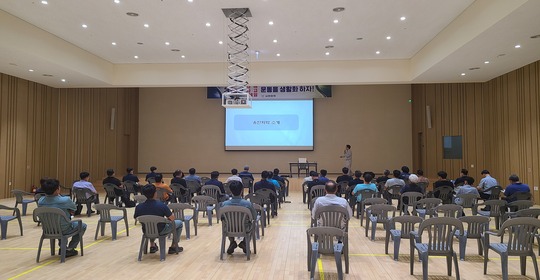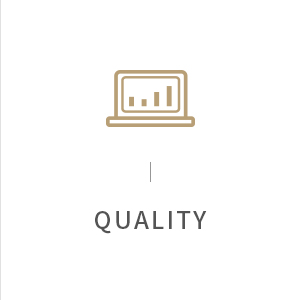 KOREAN
KOREAN

YUHANPROMOTES
BETTER HEALTH AND LIFE
Yuhan Chemical is doing its best to supply excellent APIs for the healthy lives of people around the world.


We respect the value of win-win and cooperation and strive to realize win-win cooperation through regular and active communication with partners. In order to achieve sustainable shared growth with partners,
we share and put into practice Yuhan Chemical's ESG management philosophy and code of conduct with our partners. We will strive to fulfill our responsibilities toward our partners as their closest and most trustworthy stakeholder.
Code of Conduct
Introduction
We are establishing and implementing strategies to grow together with partners (hereinafter referred to as the “Subsidiaries/Contractees”) based on the Company’s management philosophy.
In addition, in order to faithfully meet the social responsibility demands from various stakeholders and fulfill our role as a corporate citizen, we established the Yuhan Chemical Partner Code of Conduct.
The Yuhan Chemical Partner Code of Conduct (hereinafter referred to as the “Code”) applies to all types of organizations that design, sell, manufacture or provide products and services used in producing Yuhan Chemical products, and through this, we present our demands to subsidiaries/contractees.
All subsidiaries/contractees doing business with us shall respect and comply with this Code and respond faithfully to requests for data and visits for evaluation to diagnose Yuhan Chemical's sustainability risks. They shall also ensure that any suppliers they do business with comply with this Code.
If there is a conflict between this Code and local laws, the stricter standards are applied, but local laws are also respected.
Main
Human Rights and Labor Practices
Subsidiaries/contractees shall protect the human rights and guarantee the dignity of all types of workers, including contract workers, temporary workers, and interns, at a level acceptable to the international community, and make regular efforts to improve working conditions.
① Voluntary work Subsidiaries/contractees shall not use forced, bonded or involuntary labor, and no worker shall have to pay for considerations for their work (work to pay off debt) or be deprived of their freedom of movement.
② Prohibition of discrimination or non-discrimination Subsidiaries/contractees shall provide a non-discriminatory work environment, shall not discriminate against executives and employees in employment-related areas, such as recruitment, hiring, promotion, etc., based on their social status and political views, including gender, sexual orientation (homosexuality), race, color, ethnicity, nationality, religion, political affiliation, labor union membership, disability, age, pregnancy, marital status, etc., and shall respect the diversity of executives and employees.
③ Observing wages, benefits, and working conditions Subsidiaries/contractees shall pay workers in accordance with applicable wage laws, including minimum wages, overtime pay, and mandatory benefits, comply with the legal working hours of each country in which they do business, and provide all executives and employees with reasonable compensation for their work, along with a paystub.
④ Prohibition of forced labor and child labor Subsidiaries/contractees shall not engage in acts such as assault, intimidation, or confinement against any executives or employees, or force them to work against their free will, and shall prohibit child labor in principle.
⑤ Protection of local residents and customers’ human rights Subsidiaries/contractees shall ensure that their executives and employees do not infringe on the human rights of local residents when performing work, and protect local residents' rights to safety, health, and freedom of residence. When providing products and services, the protection of customers' lives, health, and property shall be given top priority, and the best measures shall be taken to protect personal information collected through management activities.
⑥ Guaranteeing freedom of association and collective bargaining Subsidiaries/contractees shall respect the Labor Relations Act of the countries to which these basic human rights and labor principles apply and provide sufficient opportunities for communication to all executives and employees.
The Environment
Subsidiaries/contractees shall operate in an environmentally responsible and efficient manner to minimize adverse impacts on the environment and comply with environmental laws and regulations. Subsidiaries/contractees shall make every effort to reduce environmental pollution, such as obtaining environmental permits required for business operations, reducing the generation of waste, wastewater, and air pollutants, reducing noise and energy consumption, minimizing greenhouse gas emissions, managing hazardous chemicals stringently, and complying with regulations on hazardous substances in products, and take measures to prevent environmental accidents.
① Environmental permits and reporting Subsidiaries/contractees shall comply with all applicable environmental regulations, obtain all necessary environmental permits, licenses, and information registrations and restrictions, and comply with operational and reporting requirements.
② Control of hazardous chemical substances Subsidiaries/contractees shall establish and operate a safety management system at all stages, from purchase to use, storage, and disposal of chemicals to prevent health or environmental hazards caused by hazardous chemicals, and comply with local laws and regulations that prohibit or regulate the use or handling of certain substances.
③ Waste and wastewater management Subsidiaries/contractees shall, where required by applicable laws and regulations, identify, monitor, control and treat waste and wastewater generated from industrial processes and sanitary facilities prior to discharge, and take measures to reduce the generation of waste and wastewater. Additionally, they shall monitor the efficiency of the wastewater treatment process at all times.
④ Management of air pollution Subsidiaries/contractees shall identify, monitor, and control the characteristics of volatile organic compounds, aerosols, corrosives, fine powders, ozone-depleting substances, and combustion by-products generated during the manufacturing process prior to discharge, if this is required under relevant laws and regulations, and manage, treat and discharge various substances in accordance with local laws and regulations.
⑤ Management of energy consumption and greenhouse gas emission Subsidiaries/contractees shall identify energy consumption and greenhouse gas emissions at the company-wide and business site level by stages. They shall also find effective ways to increase energy efficiency while minimizing energy consumption and greenhouse gas emissions.
⑥ Sustainable procurement of raw materials Subsidiaries/contractees shall reduce the environmental impact of raw material procurement, and procure raw materials more safely and reliably. Natural resources such as forests and water resources are essential for maintaining the ecosystem, so the impact on the environment must be recognized when carrying out business. Measures to minimize the environmental impact shall be planned and implemented. Subsidiaries/contractees shall clarify the source of minerals distributed along the supply chain (tantalum, tin, tungsten, gold, cobalt, etc.) and ensure that minerals in products/equipment were mined legally and humanely.
Fair Operating Practices
Subsidiaries/contractees shall recognize the importance of ethical management for sustainable growth and comply with all local laws and regulations. To ensure that executives and employees can make ethical decisions and judgments, they shall establish and improve regulations, guidelines, etc., and conduct regular monitoring.
① Honesty and anti-corruption Subsidiaries/contractees shall maintain the highest standards of honesty in all transactions with companies. They shall not engage in any form of corruption, extortion, or embezzlement; receive/offer bribery; provide gifts; or provide money or other forms of benefits to related parties for the purpose of influencing decision-making. In addition, they shall not provide or receive any means to obtain unfair or inappropriate benefits, and shall implement surveillance and crackdown procedures to practice autonomous compliance with anti-corruption laws. Moreover, they shall not engage in unfair acts by taking advantage of their superior position over suppliers, and shall not engage in acts of collusion such as raising prices, dividing the market, or controlling shipments for the purpose of avoiding competition.
② Information disclosure Subsidiaries/contractees shall record and disclose information on business activities, performance, and financial structure based on laws and regulations on information disclosure and industry practices. It is prohibited to falsify or misrepresent records regarding the actual conditions and practices of related areas within the supply chain.
③ Protection of intellectual property Subsidiaries/contractees shall respect intellectual property rights, and any transfer of technology and know-how shall be done in a way that protects those rights. Additionally, Yuhan Chemical's information shall be safely protected.
④ Protection of personal information Subsidiaries/contractees shall protect the personal information of all parties related to corporate management, including themselves, customers, consumers, and employees, at a reasonable level. They shall establish a management system for storage, processing, transmission, and sharing of personal information in compliance with personal information protection laws regarding the handling and use of personal information, and monitor it.
Safety & Health
Subsidiaries/contractees shall recognize that it is essential to establish a safe and healthy working environment and ensure the safety and health of workers in order to continuously maintain quality and increase production efficiency, and cooperate with the main contractors in accordance with local laws and regulations to settle a safety-first culture. They need to make continuous efforts to improve upon potential risk factors.
① Industrial safety Subsidiaries/contractees shall take measures to prevent industrial disasters and occupational diseases by eliminating potential hazards in advance. They identify, evaluate, and mange chemical, biological, and physical risks through risk assessment activities, and assess safety risks of production facilities and other facilities to establish and implement improvement measures accordingly. They shall control the risks by means of engineering improvements in areas such as design, engineering, preventive maintenance, etc., and administrative improvements including safe work procedures, ongoing safety training and education, and provision of appropriate protective equipment.
② Control of physical overload at work Subsidiaries /contractees shall identify, evaluate, and control tasks that are physically taxing on workers, such as manual labor, heavy or repetitive lifting, standing for long periods of time, and highly repetitive or physically demanding assembly tasks.
③ Industrial disaster and disease management Subsidiaries/contractees shall establish procedures and systems to prevent, manage, track and report industrial disasters and occupational diseases. For this, provisions shall be established to encourage the reporting of physical abnormalities by employees, classify and record cases of injury and illness, provide necessary treatment, take corrective action to eliminate the cause, and facilitate the employee's return to work. In addition, we recommend that subsidiaries/contractees conduct process improvement, offer facilities for appropriate rest and stretching, and allocate personnel to prevent industrial disasters and occupational diseases caused by physical labor and work environments.
④ Provision of hygiene and facilities Subsidiaries/contractees shall provide employees with clean restrooms and potable water, sanitary food preparation, storage, and dining facilities. Additionally, dormitories for workers shall be kept clean and safe, and an appropriate environment with appropriate emergency exits, firefighting facilities, heating and ventilation, adequate personal space, and reasonable access rights shall be provided.
⑤ Safety and health education Subsidiaries/contractees shall conduct appropriate safety and health training for their workers. Additionally, health and safety information shall be posted in a conspicuous place at the workplace. All of this information shall be provided in the worker's native language or a language the worker can understand.
Supplementary Provisions
1. (Enactment) This Yuhan Chemical Code of Conduct for Subsidiaries/Contractees shall be enacted and enforced from September 19, 2023.
-

Yuhan Chemical Subsidiaries/Contractees ESG Training (Ansan)
-

Yuhan Chemical Subsidiaries/Contractees ESG Training (Hwaseong)









